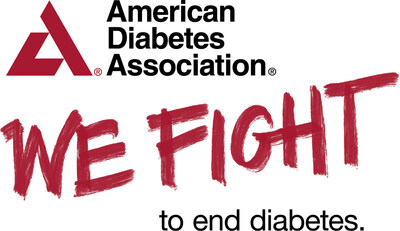Strategic collaboration formed to raise
awareness that all people with diabetes on blood glucose-lowering
medications should have glucagon, preferable a ready-to-use
formulation
CHICAGO and ARLINGTON, Va., Jan. 21,
2025 /PRNewswire/ -- The American Diabetes
Association® (ADA) and Xeris Pharmaceuticals®
(Xeris BioPharma Holdings, Inc.), a national supporter of the ADA,
are pleased to announce a multi-year strategic partnership to
reinforce the importance of prescribing glucagon, preferably
ready-to-use, for all individuals with diabetes who are treated
with insulin and/or insulin secretagogues or those at high risk of
hypoglycemia (low blood glucose, also called low blood sugar), in
line with the ADA's recently updated Standards of Care in
Diabetes—2025 (Standards of Care).1

"Severe hypoglycemia is life-threatening, and people with
diabetes on blood glucose-lowering medication are at risk for
hypoglycemia. Thus, we must act with urgency to educate people
about the importance of having a treatment plan in place that
includes having glucagon on hand," said Charles "Chuck"
Henderson, the ADA's chief
executive officer. "Through this important partnership, we can save
lives by ensuring individuals with diabetes who are treated with
insulin have access to glucagon, preferably a ready-to-use
formulation, so they can make a plan and be ready."
It is estimated that up to 46% of people with type 1 diabetes
and 21% of those with type 2 diabetes using insulin experience at
least one severe hypoglycemia event each year.2
Hypoglycemia is conservatively responsible for more than 202,000
emergency department visits annually with approximately 25% being
admitted to the hospital.3 This is unacceptable. More
needs to be done to protect people at risk for severe
hypoglycemia.
The ADA, with support from Xeris, seeks to rectify the low rates
of appropriate glucagon prescriptions by developing education
materials and training resources for health care professionals and
people living with diabetes, as well as through a national
awareness campaign to educate people on who is at risk for severe
hypoglycemia and should have glucagon, preferably ready-to-use, as
a safety net.
"Severe hypoglycemia is associated with up to a three-time
increased risk of death in people with diabetes.4,5,6
Xeris is proud to collaborate with the ADA to urge adoption of
their strengthened clinical practice recommendations around the
treatment of severe hypoglycemia," said John Shannon, Xeris' CEO. "The stakes are too
high for so many patients at risk to be without a safety net. Our
mutual commitment is to fight for all patients living with diabetes
and ensure that they can face severe low blood glucose emergencies
with confidence by always having a ready-to-use glucagon on
hand."
To learn more about the importance of severe hypoglycemia,
readiness and treatment options, visit diabetes.org/severehypo.
About the American Diabetes Association
The American Diabetes Association (ADA) is the nation's leading
voluntary health organization fighting to end diabetes and helping
people thrive. For 84 years, the ADA has driven discovery and
research to prevent, manage, treat, and ultimately cure diabetes.
There are 136 million Americans living with diabetes or
prediabetes. Through advocacy, program development, and education,
we're fighting for them all. To learn more or to get involved,
visit us at diabetes.org or call 1-800-DIABETES (800-342-2383).
Join the fight with us on Facebook (American Diabetes Association),
Spanish Facebook (Asociación Americana de la Diabetes), LinkedIn
(American Diabetes Association), and Instagram (@AmDiabetesAssn).
To learn more about how we are advocating for everyone affected by
diabetes, visit us on X (@AmDiabetesAssn).
About Xeris
Xeris (Nasdaq: XERS) is a
growth-oriented biopharmaceutical company committed to improving
patient lives by developing and commercializing innovative products
across a range of therapies. Xeris has three commercially available
products: Recorlev®, for the treatment of endogenous Cushing's
syndrome; Gvoke®, a ready-to-use liquid glucagon for the treatment
of severe hypoglycemia; and Keveyis®, a proven therapy for primary
periodic paralysis. Xeris also has a pipeline of development
programs led by XP-8121, a Phase 3-ready, once-weekly subcutaneous
injection for hypothyroidism as well as multiple early-stage
programs leveraging Xeris' technology platforms, XeriSol® and
XeriJect®, for its partners.
Xeris Biopharma Holdings is headquartered in Chicago, IL. For more information, visit
www.xerispharma.com, or follow us on X, LinkedIn, or Instagram.
- American Diabetes Association Professional Practice Committee;
6. Glycemic Goals and Hypoglycemia: Standards of Care in
Diabetes—2025. Diabetes Care 1 January 2025; 48
(Supplement_1):
S128–S145. https://doi.org/10.2337/dc25-S006
- Stuckey HL, Desai U, King SB, et al. The experience of a severe
hypoglycaemic event from the perspective of people with diabetes
and their caregivers: "What am I going to do?". Diabet
Med. 2022;39(4):e14745. doi:10.1111/dme.14745
- Centers for Disease Control and Prevention. National Diabetes
Statistics Report. Accessed January 8,
2025.
https://www.cdc.gov/diabetes/php/data-research/index.html
- Seaquist ER, Anderson J, Childs B, et al. Hypoglycemia and
diabetes: a report of a workgroup of the American Diabetes
Association and the Endocrine Society. Diabetes Care.
2013;36(5):1384-1395. doi:10.2337/dc12-2480
- McCoy RG, Van Houten HK, Ziegenfuss JY, Shah ND, Wermers RA,
Smith SA. Increased mortality of patients with diabetes reporting
severe hypoglycemia. Diabetes Care. 2012;35(9):1897-1901.
doi:10.2337/dc11-2054
- Zoungas S, Patel A, Chalmers J, et al. Severe Hypoglycemia and
Risks of Vascular Events and Death. N Engl J Med.
2010;363(15):1410-1418. doi: 10.1056/NEJMoa1003795.
Contact: Virginia Cramer, (703)
253-4927
press@diabetes.org
 View original content to download
multimedia:https://www.prnewswire.com/news-releases/the-american-diabetes-association-and-xeris-pharmaceuticals-announce-national-collaboration-to-provide-life-saving-hypoglycemia-education-and-awareness-302355703.html
View original content to download
multimedia:https://www.prnewswire.com/news-releases/the-american-diabetes-association-and-xeris-pharmaceuticals-announce-national-collaboration-to-provide-life-saving-hypoglycemia-education-and-awareness-302355703.html
SOURCE American Diabetes Association